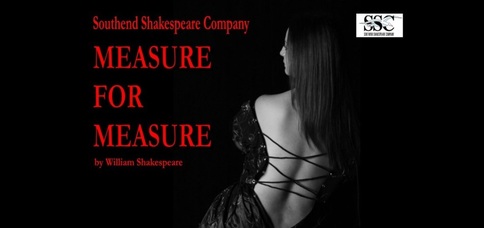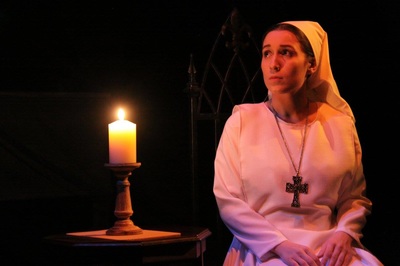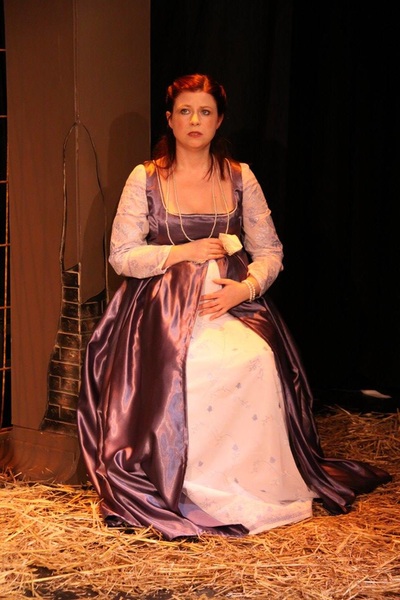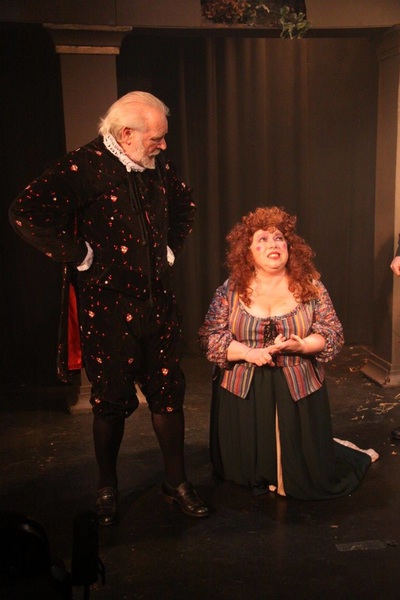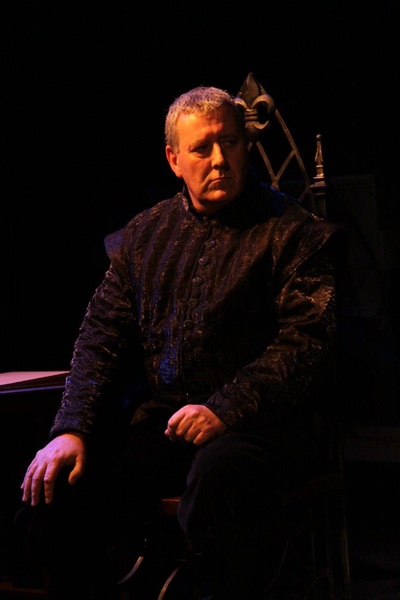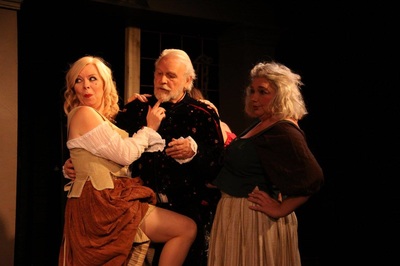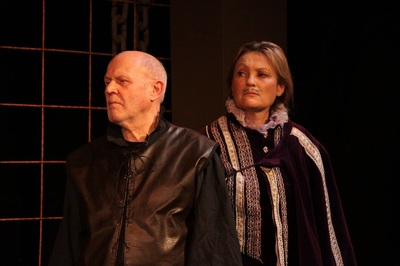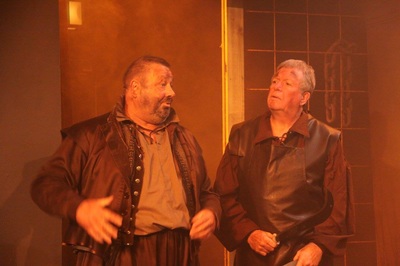Measure for Measure
Southend Shakespeare Company
22nd to 26th November 2016
Southend Shakespeare Company
22nd to 26th November 2016
MEASURE for Measure is classified by scholars as one of Shakespeare's “problem plays”. In fact, the only real problem is to understand why this scintillating, high voltage play is not performed more often.
Southend Shakespeare Company players clearly recognise the play's worth. Measure for Measure offers a whole spectrum of great characters, even by the Bard's standards, and the actors in this production have seized the opportunities with gusto and what looks like gratitude.
Director Peter Finlay moulds them into a memorable production that ensures there is never a dull moment. This Measure for Measure carries you along at a high emotional pitch, yet it also contrives to be very entertaining. I was constantly struck by its inventiveness. One scene in particular, staged in silence behind a gauze curtain, will haunt you for a long time after. This spirit of invention is everywhere, in darker moments, and in lighter moments.
There are plenty of both in Measure for Measure. Indeed, the scenes shuttle between the grim and the comic at a such a rate of knots that they almost fall over each other. This is a near-tragedy that ends as romance, the tensest of melodramas married to a raucous comedy. The bawdiness count is probably the highest in Shakespeare - no mean statistic.
Measure for Measure threads all these elements into a tale of self-discovery and odious hypocrisy. The Duke of Vienna pretends to absent himself from his domain for a while, leaving matters of state in the hands of his deputy, Angelo. In the Duke's absence, Angelo enforces a crackdown on the sexual license that he feels has overwhelmed the city. “The law,” he proclaims, “has slept.”
First to feel the whip-hand is the young gentleman Claudio. He is sentenced to death for making his fiancee pregnant.
Claudio's sister, Isabella, a novice nun, pleads with Angelo for her brother's life. Her mission has an unintended consequence. Angelo gets the passionate hots for Isabella. Discarding his principles like a snake shuffling its skin, he offers her a deal – sleep with him, and he will spare Claudio.
Meanwhile, the Duke, in disguise as a friar, is still pulling strings on the quiet. He successfully resolves the situation and engineers an ostensibly happy ending. Yet in the process, he has found out things about his city, and about himself, that he, and we, find deeply disturbing. “I have seen corruption boil and bubble,” he says, “till it o'errun the stew.” Measure for Measure is set in Vienna, but did Shakespeare have a closer-to-hand city - Elizabethan London - in mind?
Andrew Sugden, as the Duke, does a brilliant job in portraying a man on a journey, somehow both authoritative and confident, yet filled with self-doubt at the same time. This is the part that stitches the whole diverse play together, but also perhaps a fairly thankless one, when other actors are having so much fun.
First among these is David Hannington, hilarious as Lucio, a voluble and boastful man-about-town, inclined to the wildest of porkies. He shadows the disguised Duke, providing a series of great comic moments as he digs himself deeper and deeper into trouble. His Act V come-uppance (“This may prove worse than hanging”) provides a comic moment that should be Tweeted around the country.
Yet this is just one in a series of rich comic performances, which include Julie Carter as a pox-ridden brothel madam, Chris Linnat-Scott as the worrisome pimp Pompey, and Peter Bailey as an executioner with what many may judge as an ill-considered pride in his tradecraft. A chorus of sultry tarts, played with great devotion by Wendy C. Wilson, Madeleine Rigby, and Kim Tobin, also help to lower the tone and raise the laughter count.
Topping the list, though, is Ross Norman-Clarke, as Barnardine, described by Shakespeare as “a dissolute prisoner”. Barnardine does not really influence the story very much one way or the other, yet in no more than a couple of brief appearances, he threatens to steal the show – so much so, that you wish Shakespeare had written an entire play about him. Mr Norman-Clarke manages to make Barnardine so physically disgusting that you want to ring the council to remove him. Yet from beneath the puss, blood and booze stains emerges a force of personality strong enough to talk himself out of a public execution.
On the more serious side, Edina Fisher-Allen is a welcome addition to the SSC company. As Isabella, she manages to achieves a tough balancing act. Her Isabella is virtuous without being stuffy, and you can see why Angelo would lose his head to her. Tracey-Anne Bourne as Angelo's dumped girl-friend Mariana is especially moving, bringing a welcome strain of lyricism to the play.
Dave Lobley as Angelo speaks the verse powerfully, and in a way that searches out all the many levels of meaning in the text. A man of whom Lucio says : “When he makes water, his urine is congealed ice.”
This is an insignificant blip, however, in yet another production from SSC which proves that the Bard lives in Southend just as much as Stratford-on-Avon. The play is also full of lines and situations that tap the mood of the planet in 2016. Measure for Measure may be 400 years old, but it uncannily captures the mood of the world we live in today.
Tom King
Measure for Measure
Palace Theatre (Dixon Studio), Westcliff
Nightly at 7.45 until Sat Nov 26, mat Sat 3pm
Box office: 01702 351135 www.southendtheatres.org.uk
Photo credits: Jim Carter & Peter Finlay
Southend Shakespeare Company players clearly recognise the play's worth. Measure for Measure offers a whole spectrum of great characters, even by the Bard's standards, and the actors in this production have seized the opportunities with gusto and what looks like gratitude.
Director Peter Finlay moulds them into a memorable production that ensures there is never a dull moment. This Measure for Measure carries you along at a high emotional pitch, yet it also contrives to be very entertaining. I was constantly struck by its inventiveness. One scene in particular, staged in silence behind a gauze curtain, will haunt you for a long time after. This spirit of invention is everywhere, in darker moments, and in lighter moments.
There are plenty of both in Measure for Measure. Indeed, the scenes shuttle between the grim and the comic at a such a rate of knots that they almost fall over each other. This is a near-tragedy that ends as romance, the tensest of melodramas married to a raucous comedy. The bawdiness count is probably the highest in Shakespeare - no mean statistic.
Measure for Measure threads all these elements into a tale of self-discovery and odious hypocrisy. The Duke of Vienna pretends to absent himself from his domain for a while, leaving matters of state in the hands of his deputy, Angelo. In the Duke's absence, Angelo enforces a crackdown on the sexual license that he feels has overwhelmed the city. “The law,” he proclaims, “has slept.”
First to feel the whip-hand is the young gentleman Claudio. He is sentenced to death for making his fiancee pregnant.
Claudio's sister, Isabella, a novice nun, pleads with Angelo for her brother's life. Her mission has an unintended consequence. Angelo gets the passionate hots for Isabella. Discarding his principles like a snake shuffling its skin, he offers her a deal – sleep with him, and he will spare Claudio.
Meanwhile, the Duke, in disguise as a friar, is still pulling strings on the quiet. He successfully resolves the situation and engineers an ostensibly happy ending. Yet in the process, he has found out things about his city, and about himself, that he, and we, find deeply disturbing. “I have seen corruption boil and bubble,” he says, “till it o'errun the stew.” Measure for Measure is set in Vienna, but did Shakespeare have a closer-to-hand city - Elizabethan London - in mind?
Andrew Sugden, as the Duke, does a brilliant job in portraying a man on a journey, somehow both authoritative and confident, yet filled with self-doubt at the same time. This is the part that stitches the whole diverse play together, but also perhaps a fairly thankless one, when other actors are having so much fun.
First among these is David Hannington, hilarious as Lucio, a voluble and boastful man-about-town, inclined to the wildest of porkies. He shadows the disguised Duke, providing a series of great comic moments as he digs himself deeper and deeper into trouble. His Act V come-uppance (“This may prove worse than hanging”) provides a comic moment that should be Tweeted around the country.
Yet this is just one in a series of rich comic performances, which include Julie Carter as a pox-ridden brothel madam, Chris Linnat-Scott as the worrisome pimp Pompey, and Peter Bailey as an executioner with what many may judge as an ill-considered pride in his tradecraft. A chorus of sultry tarts, played with great devotion by Wendy C. Wilson, Madeleine Rigby, and Kim Tobin, also help to lower the tone and raise the laughter count.
Topping the list, though, is Ross Norman-Clarke, as Barnardine, described by Shakespeare as “a dissolute prisoner”. Barnardine does not really influence the story very much one way or the other, yet in no more than a couple of brief appearances, he threatens to steal the show – so much so, that you wish Shakespeare had written an entire play about him. Mr Norman-Clarke manages to make Barnardine so physically disgusting that you want to ring the council to remove him. Yet from beneath the puss, blood and booze stains emerges a force of personality strong enough to talk himself out of a public execution.
On the more serious side, Edina Fisher-Allen is a welcome addition to the SSC company. As Isabella, she manages to achieves a tough balancing act. Her Isabella is virtuous without being stuffy, and you can see why Angelo would lose his head to her. Tracey-Anne Bourne as Angelo's dumped girl-friend Mariana is especially moving, bringing a welcome strain of lyricism to the play.
Dave Lobley as Angelo speaks the verse powerfully, and in a way that searches out all the many levels of meaning in the text. A man of whom Lucio says : “When he makes water, his urine is congealed ice.”
This is an insignificant blip, however, in yet another production from SSC which proves that the Bard lives in Southend just as much as Stratford-on-Avon. The play is also full of lines and situations that tap the mood of the planet in 2016. Measure for Measure may be 400 years old, but it uncannily captures the mood of the world we live in today.
Tom King
Measure for Measure
Palace Theatre (Dixon Studio), Westcliff
Nightly at 7.45 until Sat Nov 26, mat Sat 3pm
Box office: 01702 351135 www.southendtheatres.org.uk
Photo credits: Jim Carter & Peter Finlay
